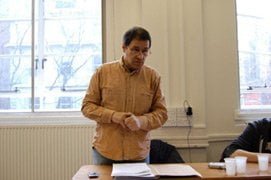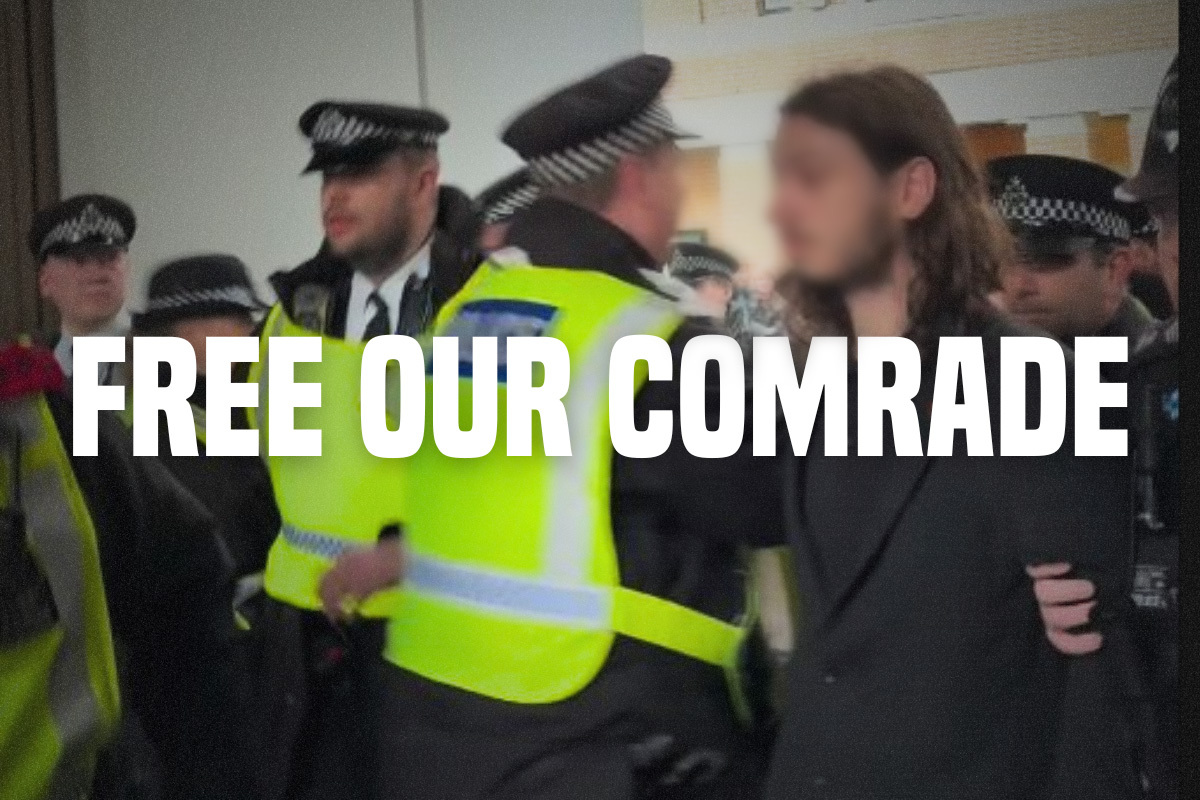As the capitalist crisis deepens so it
creates waves of political and social upheaval. Through our interventions we
have witnessed the movements of the youth in Europe against attempts to
privatise education; in Britain the demonstrations against Israel’s attack on
Gaza and the university occupations that followed. Most recently there have
been the wildcat strikes of the construction workers in Britain – not against
foreign workers as the big business media have cynically portrayed it – but for
the right of all workers, regardless of nationality, to receive the same pay
and conditions.
These
examples mean more to people than just the immediate issue they confront, but
represent the latest way in which the capitalist organisation of society fails
to deliver. In this new period of recession that is unfolding it is clear that
the solution for the ruling class is to force ordinary people to accept a
reduction of their living standards. They want us to pay for their crisis. This
is a recipe for class struggle. It is the duty of the Marxists to carry the
ideas of socialism into the labour movement. Learn the lessons of the past, in
order to prepare for the future.
On the 14th of February
Socialist Appeal held a day school in London on Cuba, Iran and the Communist
International, all of which have important anniversaries in 2009.
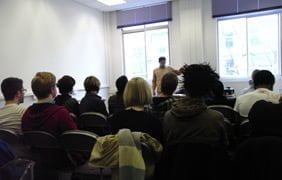
|
| Fred Weston speaks on Cuba |
The first session was on the 50th
anniversary of the Cuban revolution. Fred Weston, editor of the In Defence of
Marxism website, began by explaining the theory of the permanent revolution,
which serves to explain the development of Cuba and the inability of the local
bourgeoisie to take Cuban society forward. In fact in the 40 years previous to
the revolution, Cuban society had degenerated, as Fred explained. A lower
proportion of children went to school than in the 1920s, and the land was
hugely concentrated in the hands of a few wealthy landowners. Cuba was a
single-crop economy, wholly dependent on the production of sugar and under the
sway of the brutal dictatorship of Batista, a subservient client to US
imperialism, who presided over the death of 20,000 Cubans through political
repression.
The coming to power of the guerrillas
and Fidel Castro meant the attempt to assert a national independence, which
immediately came into conflict with the US imperialism, much like Chavez and
the Bolivarian movement did 40 years later. The attempt to achieve mild reforms
like improved healthcare and universal education paid for by taxation led to
the embargo, which still exists today. The refusal of US companies to pay
taxation on their profits led to their nationalisation, which was 90% of the
economy, abolishing capitalism in Cuba. Under the influence of the USSR Cuba
adopted the planned economy.
Fred also spoke on the ‘special period’
that followed the fall of the Soviet Union. This led to extremely harsh
conditions and a part-privatisation of the economy, although the bulk remains
in state hands. Currently there is a lot of discussion in Cuba about the
so-called ‘Chinese road to socialism’, which in effect means the adoption of
capitalism. This would be disastrous for the people of Cuba, eradicating all
the gains made by the revolution in the past 50 years.
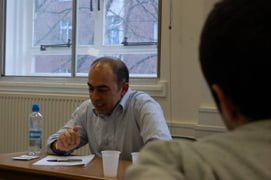 |
| Comrade Morad Shirin of the IRMT |
In the next session comrade Morad
Sharin, of the Iranian Marxist Tendency, spoke on the revolution and
counterrevolution in Iran 30 years ago this month. He began by dispelling the
most common myths of the revolution. The first was that the revolution was
Islamic. He pointed out that the revolution began as a series of strikes in the
late 1970s, which included 1.5 million workers and created strike committees (shoras)
making economic and political demands such as the end of martial law and the
release of political prisoners. Far from being a revolt against modernism – the
idea that the Iranian revolution was a Luddite rebellion – the upheavals caused
by land reform dispossessed millions of peasants; but rather than
proletarianise them in industry in the cities, the reforms made meant the
pauperisation of a huge influx of landless peasants that could not be given
work in a backward capitalism that could only really develop economies for
export – the oil industry. The Islamists were able to whip up this backward
layer of the population, not because of an Iranian predisposition to oppose all
things Western, but because of the inability of the Iranian bourgeoisie to
develop the productive forces and the failure of ‘the left’ to offer an
alternative.
Morad also talked of the lessons that
can be learnt from the revolution. One is of revolutionary strategy – the
Iranian left generally did not believe that the working class was strong enough
to smash the bourgeois state and replace it with a workers’ state. They
believed then – as many maintain today – that the next stage is the democratic
revolution, one of bourgeois democracy and the support of private property. The
illusion is that this will also develop the consciousness of the Iranian
working class, and in time the conditions for the proletarian revolution will
develop. This is the classic position of Menshevism. From the beginning the
Marxists must have as their programme the socialist revolution and the conquest
of state power by the working class.
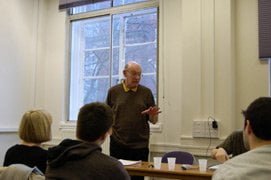
|
| Mick Brooks speaks on the 3rd International |
In the final session Mick Brooks, editor
of Socialist Appeal, spoke on the Communist, International, which was formed 90
years ago this March. It was formed as the world party for socialist revolution
and developed out of mass splits in the 2nd International, the majority of
which had capitulated to their ruling classes in 1914 and supported the First
World War. Mick explained the material foundations for the degeneration of the
2nd International, which left a tiny group of Internationalists that
formed the embryo of the Communist International. This included Lenin, Trotsky,
Rosa Luxemburg and Karl Liebknecht.
The coming of the Russian revolution in
1917 shook the world. As Lenin said, imperialism broke at its weakest link. The
forces of the Bolsheviks, who were only 3% of the Russian working class at the
beginning of the revolution, in the course of a year had conquered state power.
This was not because of a putsch, or by going behind the backs of the workers,
but by going through the experience of the revolution shoulder to shoulder with
the working class. What it shows is that nothing can stop an idea whose time
has come, and the idea that only the workers themselves could take control in the
effective of the running of society was put on the order of the day.
Mick then went on to explain the
degeneration of the Russian revolution, which was intimately linked to the fate
of the world revolution. In turn the Communist International followed the fate
of the Soviet Union, transformed by the Stalinists from a tool in the hands of
the international working class to a mouthpiece of the bureaucracy.
In all sessions a lively discussion followed. It was clear that the common
thread in all discussions was that the success or failure of a revolutionary
movement depends on many factors; but in the last instance if there exists no
revolutionary leadership that is prepared to offer a clear lead, inevitably
that lead will be usurped by other elements unable to match up to the task
posed by history: the conquest of power by the working class. The stories of
the revolutionary movements of the 20th century are the stories of
the heroic sacrifices of countless working class revolutionaries, often
betrayed by the Stalinist and reformist leaderships. With a clear Marxist
leadership the course of history could have been radically different.
Our ability to learn from the past will
only be shown by our ability to intervene in the great events that loom on the
horizon. Our success will show that the great revolutionaries of the 20th
Century will not have fought in vain.

